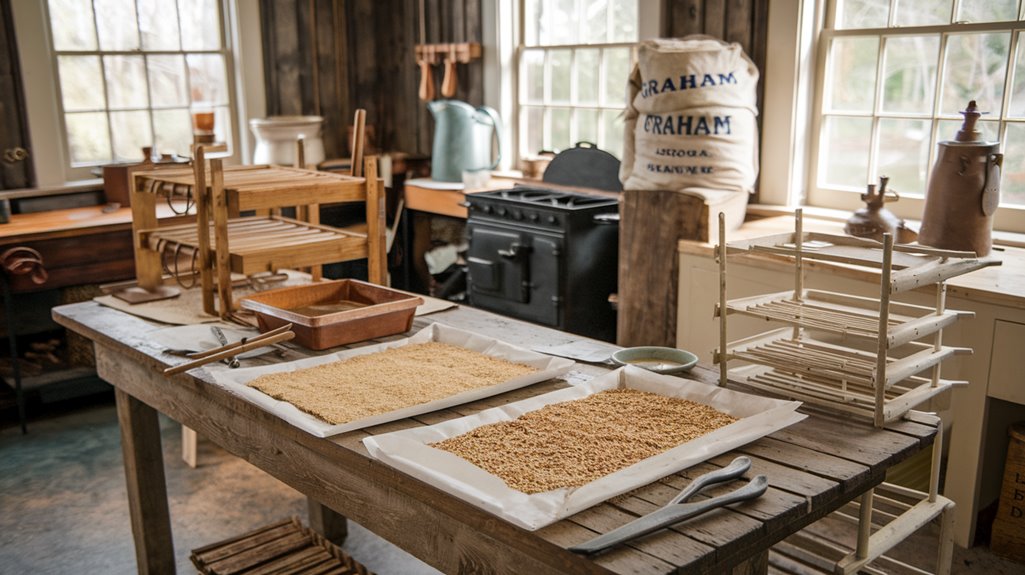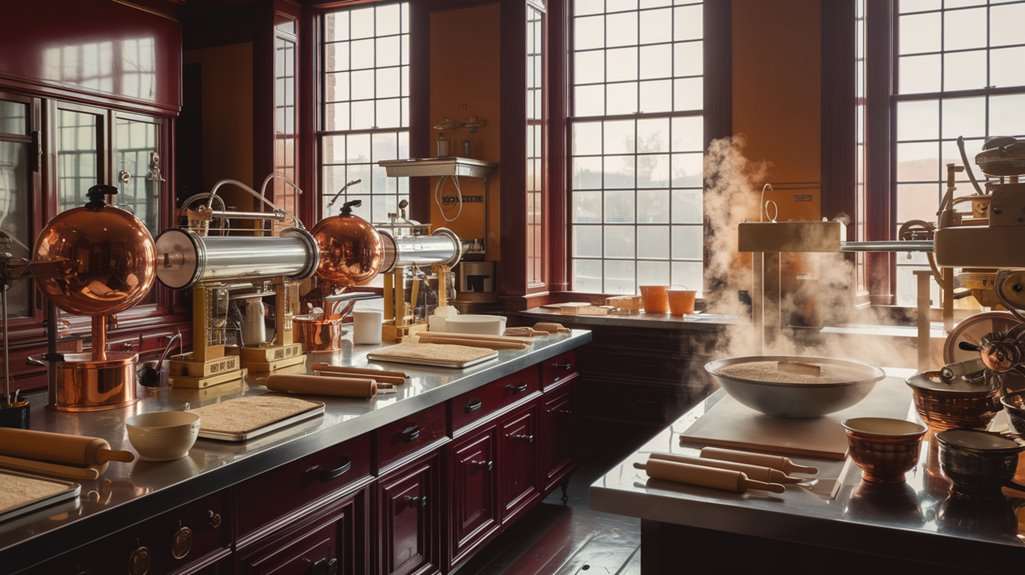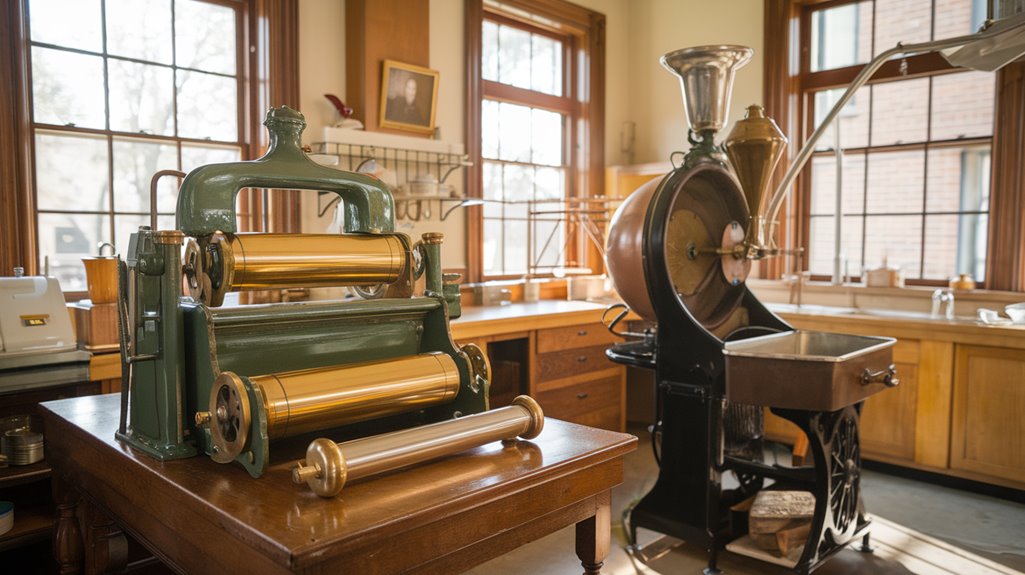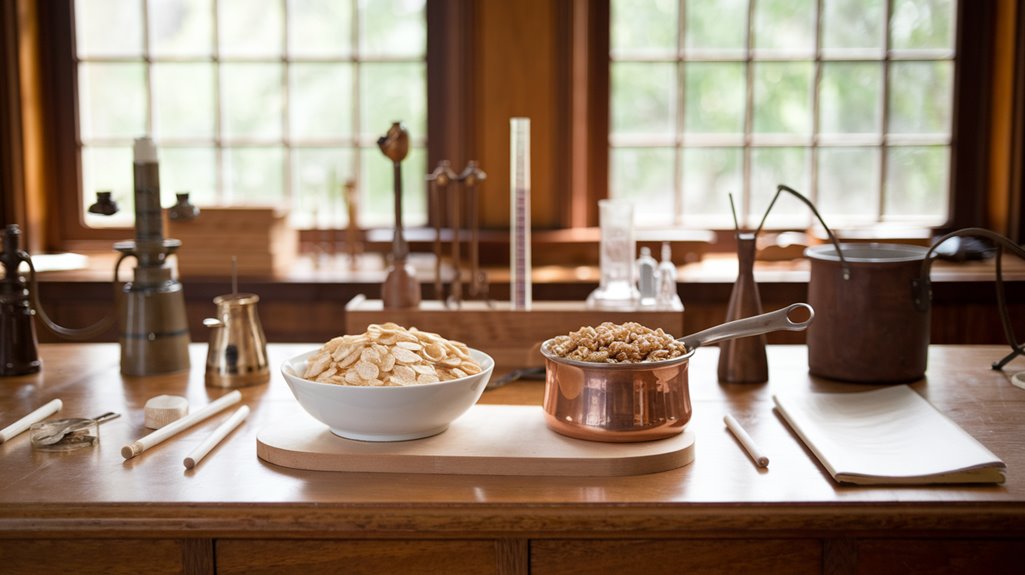Two Inventors Who Gave Us Breakfast as We Know It
Your morning bowl of cereal tells a tale as rich as cream poured over granola. You've probably never given much thought to who invented your breakfast, but two revolutionary minds in the 1800s transformed the first meal of the day from heavy, greasy fare into something altogether different. Behind the story of breakfast's evolution, you'll find an unlikely pair: a health reformer and a doctor who didn't just change what Americans ate—they sparked a cultural revolution that's still shaping your breakfast choices today.
The Birth of Cold Breakfast Cereal: James Caleb Jackson's Vision

While hot, heavy breakfasts dominated American tables in the 19th century, James Caleb Jackson revolutionized morning meals with his invention of cold cereal in 1863.
At his health spa, the Our Home Hygienic Institute, Jackson created Granula, a revolutionary breakfast alternative made from graham flour. His dedication to natural health principles guided his development of simple, wholesome foods. Jackson believed that many health issues stemmed from digestive system problems. The Granula ingredients were simple but required overnight soaking in milk due to their hard, brittle texture.
You might be surprised to learn that Jackson's invention didn't achieve widespread popularity during his lifetime.
However, his innovative concept caught the attention of John Harvey Kellogg, who later adapted the idea.
When Kellogg used the name "Granula" for his own cereal, Jackson sued him, protecting his legacy as the true pioneer of cold breakfast cereal in America.
From Medicine to Mainstream: Dr. John Harvey Kellogg's Legacy
Building on Jackson's cereal innovation, Dr. John Harvey Kellogg transformed breakfast forever through his medical innovations at the Battle Creek Sanitarium. While experimenting with wheat, he accidentally discovered a process to create easily digestible flaked cereals, leading to the invention of corn flakes in 1896.
The new breakfast food proved immensely successful, with over 100,000 pounds sold in its first year on the market. Seventh-day Adventist beliefs heavily influenced his approach to health and nutrition.
Beyond cereal, Kellogg's dietary reforms reshaped America's eating habits. You'll recognize his influence in many modern health foods – he developed peanut butter, soy milk, and promoted yogurt as part of a healthy diet.
His "biologic living" philosophy combined scientific knowledge with holistic health practices, including exercise and hydrotherapy. While his brother Will later commercialized the cereal business, Dr. Kellogg's legacy lives on through his revolutionary approach to nutrition and the breakfast industry he helped create.
Battle Creek's Cereal Revolution
As Battle Creek, Michigan, emerged as the "cereal capital of the world" in the early 20th century, over 80 cereal companies competed for America's breakfast tables.
By 1910, only a handful survived, with Kellogg's, Ralston, and Post leading the way through innovative cereal marketing and widespread distribution. C.W. Post became one of Kellogg's main rivals after seeing the corn flakes' success.
You can trace the industry's transformation through W.K. Kellogg's business savvy. After founding the Battle Creek Toasted Corn Flake Company in 1906, he revolutionized breakfast trends by adding sugar to corn flakes and launching aggressive advertising campaigns. Today, the company maintains its 117-year operational presence in Battle Creek.
His success wasn't just about the product – it was perfect timing. The rise of self-service grocery stores, improved milk storage, and refrigeration made dry cereals increasingly practical for American families.
Under his leadership, what started as a local venture became a global breakfast empire.
How Health Reform Reshaped American Breakfast
Nineteenth-century America faced a widespread health crisis that would transform breakfast forever. Dyspepsia, or chronic indigestion, plagued the nation due to heavy meat consumption and rich foods.
Health reformers recognized the need for dramatic dietary changes and began promoting lighter, more nutritious alternatives. Today, specialty establishments like Lingonberry Roastery & Bakery continue this tradition by offering quality ingredients for health-conscious consumers.
These early health trends led to four major shifts in American breakfast culture:
- The invention of whole-grain products like Graham crackers and granula
- The rise of cereal as a healthier breakfast alternative
- A move away from traditional meat-heavy morning meals
- The standardization of breakfast as a distinct, lighter meal
You might be surprised to learn that what we consider normal breakfast foods today emerged from this health reform movement, with cereal companies and government nutritionists working together to reshape America's morning eating habits. Today, with regular breakfast consumption showing clear links to improved mental function and better weight regulation, these early reformers' instincts about the importance of a healthy breakfast have been validated by modern science.
The Rise of a Billion-Dollar Industry

While health reformers sparked America's breakfast revolution, savvy entrepreneurs transformed these morning meals into a staggering billion-dollar industry.
You'll find today's breakfast evolution reflected in a market that's projected to reach $725.20 billion by 2032, growing at an impressive 5.1% annually.
Consumer trends have shaped this explosive growth, as you're now more likely to demand both convenience and health-conscious options. Since the late 1970s, restaurants like Hardee's have revolutionized breakfast with their Made From Scratch Biscuits.
It's why you'll see everything from plant-based alternatives to quick-service restaurants adapting their menus. Notably, the industry has seen major growth in non-vegetarian breakfast takeout, which currently holds 67.9% of the market share.
The numbers tell the story: breakfast takeout alone is expected to hit $186 billion by 2033.
Even traditional chains like Hardee's generate 25% of their revenue from breakfast, with customers spending an average of $7.50 per visit.
The morning meal has become a powerful economic force, creating jobs and supporting local economies nationwide.










